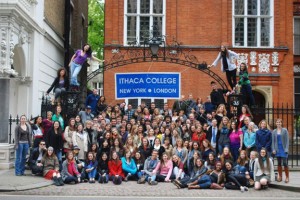In the wake of travel alerts released by the U.S. State Department earlier this month, study abroad programs at Ithaca College are working to keep students informed of suspected al-Qaeda attacks, though no direct changes have been made to any programs.

“We are not advising Americans to avoid travel to Europe first and foremost,” Noel Clay, a spokesman for the U.S. State Department, said.
The alert, released Oct. 3, has prompted response from study abroad programs connected to the college. Study abroad directors have been keeping students informed of the alerts. The decision not to mention any specific countries in the alert was based on conversations between the government and counterparts overseas, Clay said.
Unlike travel warnings, which recommend citizens defer or avoid travel in specified countries or regions, alerts urge the use of best practices while traveling and staying abroad, as described by the department.
“Travel alerts are more for short term situations, and a travel warning would be a more long term situation,” Clay said. “This alert was released to provide information about potential threats so citizens can be more aware while they travel abroad.”
Rachel Cullenen, director of study abroad at the college, said the alerts do not offer precise information.
“They’re very vague, very non-specific,” she said.
The threat level relating to the possibility of international terrorist attacks within British borders is currently set at severe, which means “a terrorist attack is highly likely,” according to the British government.
The British government provides information similar to the U.S. government about the possibility of terrorism threats, but breaks it down by country. France, Germany and Spain are all listed as having a “high threat from terrorism” on the British Foreign and Commonwealth Office website.
The State Department’s decision to release a European-related travel alert because of terrorism concerns is not unprecedented. It released one in 2004 following a train bombing in Madrid. The 2005 London bombings prompted an update to a worldwide caution statement published by the department.
Since the bombings, high terrorism threat levels have become part of life, especially after 9/11, Bill Sheasgreen, program director at the Ithaca College London Center, said.
“It follows the pattern of what we have been living with for the past 10 years or so,” he said.
Sheasgreen, who also serves as a U.S. Embassy warden for the college in London, said whenever he receives new information from the State Department pertaining to travel alerts and travel warnings, it is always passed on to students.
The State Department has advised citizens to know how to contact the American embassy or consulate and how to use pay phones. It also advises travelers to avoid standing out, stay away from unattended packages, move away from loud noises and inform local law enforcement of suspicious activities.
The warnings also extend to other major metropolitan areas in Europe. Earlier this week Saudi intelligence informed French and other European officials that France was being targeted for attack by an Arabian Peninsula branch of al-Qaeda. The branch, which formed in 2009, took the credit for the failed attempt by Umar Farouk Abdulmutallab to blow up a U.S.-bound plane Christmas Day last year.
The Office of International Programs has never had to pull students from a location or program based on political instability or terrorism. OIP has canceled plans for programs and turned down faculty program requests based on security concerns in the proposed locations, Cullenen said.
Cullenen said an example of this was a program in development for Mumbai, India. The program was canceled after attacks throughout the city in Nov. 2008.
“What we are doing is reminding our students in London of the importance of being alert, being aware of surroundings, maintaining a low profile and the importance of staying in contact with the London Center,” she said.
During the London bombings of July 2005, the London Center was not as directly affected as other programs that had students in the city at the time, Sheasgreen said. By July, most students at the London Center had already left the country for the semester.
“We adopted anything into our procedures that we thought would be useful in case that happened again,” he said.
Sheasgreen declined to detail specifics of what the plan includes but stressed the importance of London Center employees staying in contact with students.
Cullenen said each alert can be different and the London Center and other study abroad programs may need to handle them on a case-by-case basis.
“You can’t change a program based on an individual incident,” Cullenen said. “Generally speaking, everything needs to be evaluated within the context.”
Junior Chris Zivalich is studying in Germany with the Institute for the International Education of Students, one of the college’s affiliated study abroad programs.
He said he kept a level head when IES sent out an e-mail and a text message.
“I’m not too concerned, but you’re a little bit more alert to everything,” Zivalich said. “I can’t just hide in my room while I’m studying abroad.”







